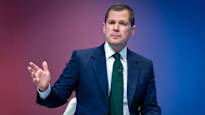The party that lost the election is heading to compete with the far-right, as the moderate former foreign minister dropped out of the leadership race, writes Britannia correspondent Kirsi Crowley.
Kirsi Crowley Britannian correspondent
LONDON The British Conservative Party has been searching for its direction after the summer’s bitter general election defeat. Now it is clear that the course is towards the far right.
The election of the party’s new leader is underway. After Wednesday’s vote, only two of the originally six candidates remained: the former Minister of Trade Kemi Badenoch and former Minister of Immigration Robert Jenrick.
Both represent the right wing of the party. They take a hard line with regard to immigration and the EU and demand the reduction of the state administration and the loosening of zero emission promises.
Jenrick also demands that Britain withdraw from the European Convention on Human Rights. He resigned from the post of immigration minister in the previous government, because even the government’s plans to send asylum seekers to Rwanda were not a tough enough policy in his opinion.
The most famous candidate abroad James Cleverly unexpectedly fell out of the leadership race in Wednesday’s voting round. The fall of the former minister of interior and foreign affairs was puzzled, because he had received the most votes in the previous day’s vote.
Some MPs have assessed, that Cleverly, who appealed to average voters with his moderation and statesmanship, dropped out of the game due to tactical voting. His supporters are believed to have wanted to ensure Badenoch were relegated and therefore voted for Jenrick, believing Cleverly would still be in charge. However, the tactics went wrong.
Cleverly’s slogan was that conservatives need to be more normal. The message clearly didn’t bite. The British media has talked about the party as confused and contentious.
Yougov, which conducts opinion polls according to the British, the reason for the electoral defeat of the Conservative Party is that it was in power for too long. They believe that the party that ruled for 14 years had thrown the country into chaos and was no longer able to control it.
According to the respondents, the words “liar”, “useless” and “corrupt” best describe the Conservative Party.
The Conservative government promised to send asylum seekers to Rwanda, even though the line did not bring an election win and the Labor Party canceled the plans after winning the election. The remaining leadership contenders still believe that the right-wing message will still resonate best with voters in the future.
It is partly due to the fact that the party is not only competing for popularity with the now ruling Labor Party. The Conservatives also lost votes to the new Reform UK far-right party, which is led by a populist politician who loudly pushed for Britain’s exit from the EU Nigel Farage.
The Conservative Party puts its own small membership before the large electorate. In the previous rounds, only 120 MPs voted in the leadership candidates’ play-off game. In November, the party’s two hundred thousand membership card holders will vote for the new leader. They are more to the right than the average party voter.
Based on opinion polls two-thirds of party members consider it more important that the new party leader represents “true conservative values” than that he wins the next election.
It is difficult to decide which of the candidates will win the presidential race. At the moment the game looks even, but Badenoch has been more popular than Jenrick according to opinion polls.
